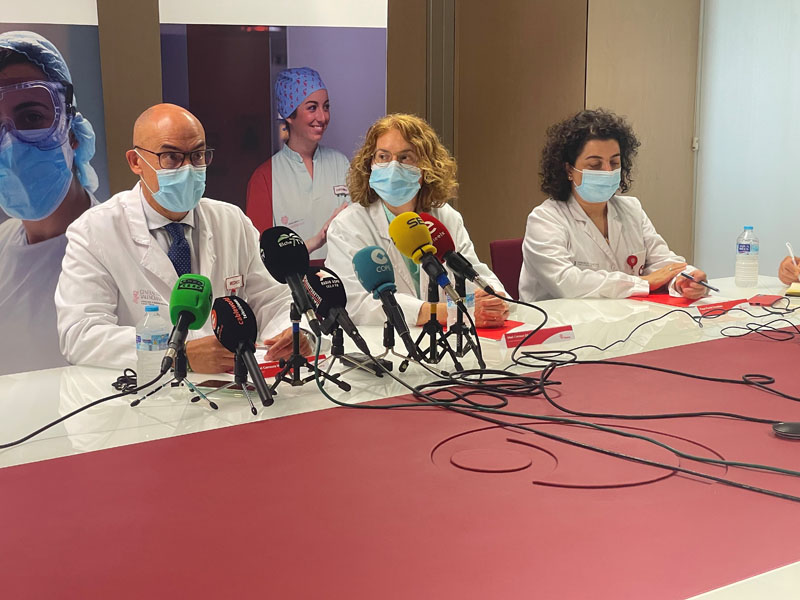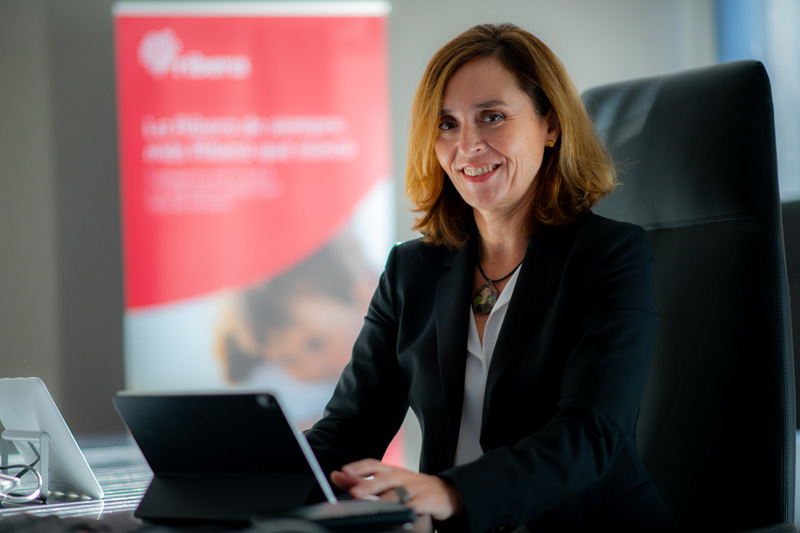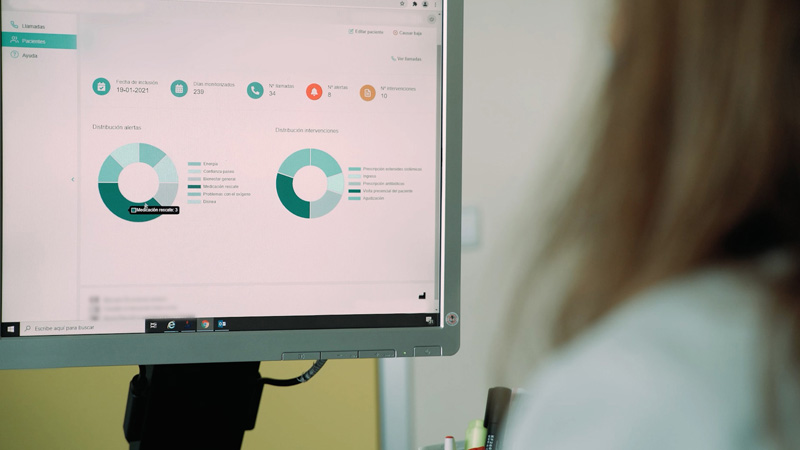
by S0p0rt3 | Jun 22, 2022 | Ribera |
- Telemonitorization, artificial intelligence and big data are the focus of the department’s main innovation projects.
- Vinalopó, the department with the shortest waiting times in the Valencian Community and a total investment of more than 134 million euros.
Vinalopó‘s Department of Health, part of the Ribera healthcare group, is celebrating 12 years since the their journey began on 1st June, 2010. Twelve years of continuous work which has consolidated quality healthcare for patients.
The Department of Health is celebrating this anniversary after a tough period due to the pandemic, in which the importance of public and private collaboration in order to face global healthcare challenges has become clear. The hospital and health centres are already working normally in order to maintain excellence in healthcare indicators. In this sense, waiting times continue to be better than the average. According to official data from the Ministry of Health, the hospital contributes to reducing waiting times in the Valencian Community, since a patient in Vinalopó is operated on in half the time when compared to the other hospitals.
The healthcare model of Vinalopó’s Department of Health is ready to meet the needs of the future patient, with innovative projects that are already being developed with startups, related to telemonitorization, artificial intelligence and big data. “Now it is not just a case of treating or preventing a disease, but predicting which diseases our population is going to develop and anticipating them” says Dr. Rafael Carrasco, the Department of Health’s managing director.
On a healthcare level, this year the entire department is preparing for reaccreditation from the Joint Commission International, the most prestigious healthcare seal in the world. And also to develop transversal projects such as the Breast Department’s multi-hospital network.
In terms of investment, it should be noted that the Ribera group has invested more than 134 million euros in infrastructure, equipment and technology since the opening of Vinalopó hospital. In the last year they have acquired a new magnetic resonance imaging machine, a CT-PET machine and improved units such as Dialysis, Day hospital and Hemodynamics. This last one aims to continue to guarantee the best patient healthcare with 24 hour care.
In the area of training and teaching, the department has established itself in recent years as a reference center for RMI and INR training. This year 21 places have been offered in 14 accredited teaching units. Currently 57 professionals are in training, some of them with the best RMI grades in Spain.
On a social level, Vinalopó has established itself as a responsible organization with initiatives such as patient council meetings, outreach projects, volunteer activities and other actions related to sustainability and in line with the 2030 Agenda’s Sustainable Development Goals.
Dr. Carrasco has insisted on the importance of placing the patient at the center of all decisions, always thinking about offering them the best healthcare, not only on a clinical level. In this regard, he has reiterated that Vinalopó University Hospital has an extensive portfolio of services and specialities of reference such as Cardiac Surgery, Nuclear Medicine, Hemodynamics, Thoracic Surgery and Vascular Surgery, amongst others. This is in addition to reference units such as the delivery department that women from all over the province choose to bring their babies into the world.
In terms of humanization, Vinalopó is one of the few hospitals in Spain to have a protocol for pet visits for patients that are admitted for a long time, as well as a serious or severe functional diversity plan which ensures universal accessibility to healthcare, improving patients’ experience and their quality of life.
Excellent results
The center’s management team has presented the progress report for this 12 year period.
- Interventions: 190.559
- Outpatient surgery rate: 70%
- Births: 17.781
- Tests:
- Radiology: 2.120.769
- PET-CT: 44.000
- Pathological Anatomy: 248.434
- Hospital Emergencies: 1.016.273
- Hospital Emergencies + health centers: 1.563.273

by S0p0rt3 | Jun 22, 2022 | Ribera |
- On the 2nd June, the BOE (Official State Gazette) published the resolution from the 7th March this year of the General Directorate of Legal Security and Public Faith, through which it is registered in the Foundations Registry.
- The President of the “Ribera Salud” Foundation is the healthcare group’s CEO, Elisa Tarazona, and of the five members of the Board, four are doctors.
The Ribera healthcare group has established its own foundation with the aim of “contributing to the overall improvement of people’s health, quality of life and well-being” whilst “responding to the Ribera group’s social commitment to the current and future population”. This is outlined in the Official State Gazette (BOE), which today published the Resolution of the 7th March this year of the General Directorate of Legal Security and Public Faith, through which the “Ribera Salud” foundation is registered in the Foundations Registry.
The president of the Ribera Foundation is the CEO of the healthcare group, Elisa Tarazona, who is “very proud” of the corporation’s new project because it will “give a further boost to key areas for the present and future of healthcare, such as research, teaching and innovation”. She is on the Board together with Alberto de Rosa, European Executive Director of Centene and Ribera board member; Doctor Carlos Catalán, Assistant Director of the group; Doctor Javier Palau, currently Managing Director of Denia’s Department of Health, which manages the Ribera group; and Doctor Julia Camps, Corporate Director of the Breast Department. Thus, the majority of the foundation’s Board members are health professionals.
The Official State Gazette (BOE) highlights, amongst the aims of the Foundation, the desire to promote and enhance the Ribera healthcare group’s preventative, predictive, participatory, personalized and population-based medicine model. “The Foundation tries to boost innovation and create a better future, giving people the necessary tools to improve their quality of life through health management and education”, it states. Furthermore, “it is committed to cutting-edge research, including new emerging illnesses that can create pandemics”.

by S0p0rt3 | Jun 22, 2022 | Ribera |
- Patients will be able to take care of their health from anywhere in the world and it will be possible to remotely monitor, and in real time, their vital signs in order to prevent possible illnesses, detecting them with the first symptoms.
- The integration of electronic health records, such as Cynara Care, makes it possible to cover all the integrated management needs of a modern healthcare organization, in which the technological focus is the main element that underpins their activity.
MADRID, 18th MAY, 2022 The pandemic has transformed telemedicine into a great ally of doctors and patients to circumvent restrictions and fear of the virus. A study by Barcelona Health Club estimates that, during the periods of the pandemic in which the infection rates were the highest and the restrictions were stricter, more than 8 out of 10 consultations were carried out remotely. Telemedicine is not simply a new concept, but the prelude to a more complex paradigm shift within healthcare, where traditional face-to-face care is combined with that which is done remotely, both in a personal way and automated.
Futurs, the technology division of the Ribera healthcare group, has been working on remote hospital development for quite some time, a revolutionary concept regarding clinical healthcare and medical monitoring that, thanks to the intensive use of various computer technologies, will allow personalized services to be offered to each patient from a non-invasive point of view. As Pablo González, the Managing Director of Futurs, explains, that approach allows for “the application of those resources that make more sense in terms of the needs of each type of patient. The idea is to segment those specific cases to help the user to have immediate accessibility to medical healthcare”.
The remote hospital in which Futurs works incorporates the use of devices connected to the Internet of Things (IoT) with which they measure the patient’s various vital signs, wherever they may be. The data is stored in their own electronic medical record, Cynara Care. Developed by Futurs and established in the Ribera healthcare group’s hospitals, it has different modules that enable the “coordination of the whole care process”, explains Mireia Ladios, Head of Quality at Ribera and Product Manager at Futurs. Thanks to that, the patients’ quality of life regarding an illness can be known before the doctor sees them in their office. “Knowing in advance, not only what happens at the hospital, but what happens in our patients’ homes is essential because it adds value to the whole care process, which is what we dedicate ourselves to”, affirms Ladios.
Furthermore, in many of the projects that are already in place, those measurements are analyzed in real time by Artificial Intelligence algorithms capable of detecting anomalies and informing a doctor so that they can check them and, when necessary, provide treatment or request additional tests.
TOOLS TO BUILD THE HEALTHCARE OF TOMORROW
Thinking about the citizen, Futurs developed a module of Cynara Care in order to incorporate different ones. Pensando en el ciudadano, Futurs desarrolló un módulo de Cynara Care para incorporar diferentes. Cynara Citizen, also known as también conocido como Yosalud, enables access to healthcare without needing to travel to the doctor’s office, clinic or hospital. With Yosalud patients are able to chat with their GP, who can prescribe them medication without them moving from where they are located. In addition, it compiles all of the patient’s reports and medical tests, and even videos of exercises recorded by the Ribera healthcare group’s professionals can be viewed.
Similarly, the ecosystem created by Futurs integrates its own solutions regarding co-innovation with start-ups developed by specialists in various healthcare areas. In the case of Minds, Ribera’s online psychological therapy, Lola the virtual carer, nutrition advice, telerehabilitation, digital dermatology consultations or patients’ telemonitorization services, amongst others. Integrations that show the potential of Cynara Cara, a versatile platform, capable of enhancing its capacity together with other companies that can offer high quality services and added value for their patients.
“From Futurs we provide the ability to give completely personalized solutions to real situations in hospitals, something that we call the ‘Living Lab’. We have direct contact with the staff that are involved in the day-to-day activities at the hospital and we are able to provide real solutions to their needs through product development teams”, explains Francisco Aznar, Software Development Manager de Futurs. In essence, we work today for the healthcare of tomorrow, focusing on telemedicine. The aim is to create a connected, intelligent, proactive and remote Hospital of the Future.
A new reality in healthcare that places the patient at the heart and meets all of their needs through technological solutions from various sources, but together on the same device which is always within the user’s reach, wherever they may be.
In the words of Pablo González during his presentation in Forbes Talks dedicated to the digitalization of the healthcare system, the benefits of applying technology to healthcare are threefold: “On the one hand, there is greater efficiency making more rational use of our resources, both in terms of our users and our professionals. On the other hand, it allows us to get optimum results, especially when it comes to healthcare quality. And, lastly, it ensures that patients have almost immediate accessibility and, more importantly, it empowers them, providing them with the necessary tools so that they feel that their needs are being met”.
ABOUT FUTURS
Futurs is the Ribera healthcare group’s technology division. Founded in 2019 as a new concept of responsible health, it combines more than 20 years of the Ribera healthcare group’s vision and clinical experience and the most innovative technology, with its own solutions and a clear commitment to coinnovation, in order to give an optimal and comprehensive answer to the care needs of the health professionals and the current and future population.
The aim of Futurs is to improve and innovate the technology associated with healthcare, in order to achieve better levels of health and wellbeing for people. We develop technology that helps to improve healthcare and excellence in care. In addition, we are in line with the Sustainable Development Goals (SDG) and 2030 Agenda, in order to contribute to the local and economic development of our environment and add value to society.

by S0p0rt3 | Jun 22, 2022 | Ribera |
Dénia Hospital has acquired a neuronavigator to carry out surgical interventions that enable the removal of tumors and reduce the risk of the surgery.
The navigation system helps to precisely locate the tumor and approach it more easily. According to Dr. Anwar Saab, Head of Neurosurgery: “It functions like a GPS”. The image of the patient’s brain scan is loaded into the software and, during the surgery, the system helps to locate the exact location of the tumor, through a marker.
The navigation system helps thet neurosurgery team to plan their approach well. According to Dr. Saab: “once we have all of the scan information, the safest pathway to the tumor can be planned”. Furthermore, he adds: “technology facilitates the enlargement of the resection and the removal of the whole tumor”.
Another function of the new neuronavigator is to carry out stereotactic biopsies. They are procedures in which the software guides the neurosurgeon in taking samples, avoiding open surgery.
According to epidemiological data, between 3,000 and 5,000 new cases of brain tumors are detected in Spain every year, of which more than half are benign. Early diagnosis and treatment are essential in order to improve the prognosis and avoid neurological consequences, highlights Dr. Alexandre Garcia, Head of Neurology at Denia Health Department.
The symptoms that are most frequently associated with brain tumors greatly vary and range from headaches, accompanied by vomiting, to seizures, visual disturbances, motor and sensory deficits or behavioural problems.
The standard therapeutic strategy for dealing with brain tumors uses increasingly precise and specialized neurosurgery, as well as more advanced radiotherapy and chemotherapy.





Recent Comments